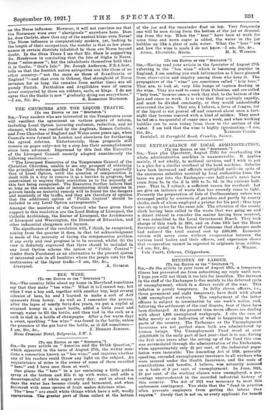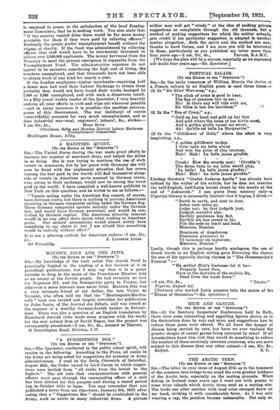MINISTRY OF LABOUR.
[To THE EDITOR Or THE " SPECTATOR.") Sts,—Be the article in your issue of August 13th, a temporary illness has prevented me from submitting my reply until now. I hope you will not think it too late for insertion. The increase in the staff of the Exchanges is due mainly to the deferred cycle of unemployment, which is a direct result of the war. This inflation is purely temporary. In Selby eleven officers, i.e., three permanent and eight temporary, have dealt with about 1,500 unemployed workers. The employment of the latter officers is subject to termination by one week's notice, and, following the settlement of the coal dispute, four of these have been discharged. At the present time seven officers are dealing with about 1,000 unemployed workpeople. I cite the case of Selby merely as an indication of what is happening in other parts of the country. The Exchanges or the Unemployment Insurance are not perfect since both are administered by human beings. The Unemployment Fund stood at over £20,000,000 in the early part of last year—that is to say, during the first nine years after the setting up of the fund this sum was accumulated through the administration of the Exchanges, when approximately only 25 per cent, of the industrial popu- lation were insurable. The Amending Act of 1920, generally speaking, extended unemployment insurance to all workers who were insured under the Health Insurance, and the scale of contributions and benefits, I believe, was actnarily assessed on a basis of 9 per cent. of unemployment. In June, 1921, 23 per cent. of the working classes were unemployed, a per- centage unprecedented in the recorded industrial history of this country. The Act of 1921 was necessary to meet this unforeseen contingency. You state that the " fund in practice often prevents employers from getting the labour they require." Surely that is not so, as every applicant for benefit
Is required to prove, to the satisfaction of the local Employ- ment Committee, that he is seeking work. You also state that " if the country wanted doles there would be far more money available for them if they were paid by relieving officers." Evidently the people prefer unemployment benefit without the stigma of charity. If the fund was administered by relieving officers that staff would have to be enormously increased to relieve over 2,000,000 applicants. The money borrowed from the Treasury to meet the present emergency is repayable from the Unemployment Fund. The administrative expenses do not appear to be excessive considering the high cost of living, the numbers unemployed, and that thousands have not been able to obtain work of any kind for nearly a year.
If the London employers—timber merchants—requiring half a dozen men had used their Labour Exchange to obtain them probably they would not have found their works besieged by 2,000 or 3,000 unemployed, and with such a disastrous result. As a fifty years' weekly reader of the Spectator, I very heartily endorse all your efforts to curb and wipe out wherever possible —and in many instances it is possible—the needless extrava- gance of this Government. The war (military) of course (unavoidably) accounts for very much unemployment, and so does industrial war—coal, engineers', joiners', &c., strikes.—
(Chairman, Selby and Howden District Labour Exchange Unemployment Committee).
Micklegate House, Selby.



































 Previous page
Previous page